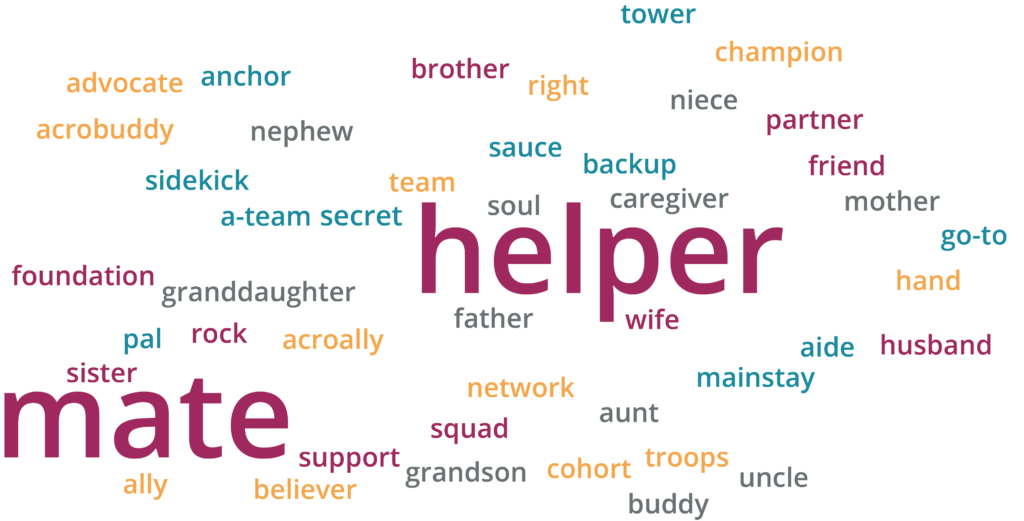SHOWING UP:
Supporting Someone with Acromegaly
Supporting Someone with Acromegaly
Each person living with an acromegaly diagnosis is on a unique, and oftentimes, challenging journey. And if you support someone who’s living with this rare, chronic disease you may find yourself on a difficult journey too.
Whether you’re a spouse, sibling, family member, co-worker, or friend, being a part of this support comes with its own set of challenges. How could it not? It’s not something most people are prepared for. Many who find themselves in a support role are just trying to show up as best they can for the person they care about. There’s no manual, and it’s important to acknowledge this. A study from the National Alliance for Caregiving revealed that people who fill this role:
“…may need more support from the doctors and care professionals they interact with. Fewer than half have had a doctor, nurse, or social worker ask what was needed to provide care to the recipient, and just one in four have had these discussions about their own care needs.”
But as many supporters know, showing up for others in this way can be time-intensive, and can fundamentally alter daily life for everyone involved. Hopefully, this content will shine a little light on this reality and offer some useful tools, exercises, and resources to help supporters like you show up for someone with acromegaly in strong, positive ways.
Let’s talk terminology
Words matter, especially the ones we attach to ourselves. When talking about the person or people who make up a support system for someone with acromegaly, there are almost as many words for it as there are people doing it. This word cloud highlights a handful of them.

Some terms may resonate with you more strongly than others, and some may not apply to you at all. But how you frame things for yourself and for the person in your life who has acromegaly can help set the tone and even outline expectations for both of you. In the end, the only definition or label that really matters is the one(s) you give yourself, or the one(s) the person in your life with acromegaly gives you, based on your own lived and shared experiences.
From this point on, for clarity and simplicity we’ll call a Person With Acromegaly a PWA. And we’re going to call the person or people who play a support role in a PWA’s life an AcroAlly or AcroAllies…with the understanding that you may very well use other terms.
What an AcroAlly Does
You probably noticed that the word cloud above wasn’t very descriptive of the things you may do as an AcroAlly. That’s very intentional because all of us are much more than the things we do. That’s why you don’t see words like chauffeur, baker, or dry-cleaning picker-upper in the cloud.
That said, it is important to acknowledge the many tasks and undertakings that can come with being an AcroAlly. This is the actions-speak-louder-than-words stuff that AcroAllies do day in and day out that make such a dramatic difference in the lives of PWAs.
Perhaps you don’t consider it anything more than being a good friend or a helpful loved one, but in reality, it’s much more than that. As an AcroAlly, your role can vary depending where your PWA is on their journey. Some days your best support may be helping with housework and meal prep. Other days you might find yourself simply lending a shoulder to lean on or an ear to listen. At other times you may be asked to administer meds and injections, or help with insurance claims.
You may also find yourself in the role of researcher, acromegaly expert, PWA advocate, or even a teacher, educating healthcare professionals on a PWA’s disease and condition. You can also play an important part in daily health care, from figuring out dosing schedules to coordinating care for comorbidities of acromegaly.
Considering participation in a clinical trial
One of the bigger items on the list of things an AcroAlly may do is finding and accessing clinical trials for a PWA. Oftentimes, because there aren’t many resources to support a person with a rare disease like acromegaly, an AcroAlly is the one who does the research and puts the clinical trial on the PWA’s radar for consideration. But your role doesn’t always stop there. Providing support, encouragement, and logistical help during the trial is very common. From trial paperwork and communicating with the study doctor, to transportation and care coordination, an AcroAlly can play a key role.
If you think the PWA in your life might like to participate in a clinical trial, a good place for an AcroAlly to start looking for one is the same place researchers and doctors look: clinicaltrials.gov. This website is a database supported by the US National Library of Medicine and is a reliable source of information about publicly and privately funded clinical studies around the world.
Contacting local hospitals and universities can be another good resource to find studies, as can patient advocacy associations like this one. In addition, free membership websites like ClinicalConnection have ways of connecting patients to clinical trials.
The Challenges of Being an AcroAlly
The physical, emotional, and financial challenges of being an AcroAlly can be significant. Stress and strain can be a factor if your daily schedule must accommodate a PWA’s life as well as your own. Self-care is important to avoid adverse effects on your emotional and mental health.
Prioritizing your own life
If your role as an AcroAlly leaves little room for much else, you may feel socially isolated or even put your own health and personal well-being last. If you’re a student, you might have to miss key classes. Those who are employed may miss work to assist with an urgent PWA-related situation and career performance may even suffer.
Family dynamics
The organizations listed in the Resources section below can be very supportive in helping you deal with these and more facets of being an AcroAlly.
The dance
Sometimes there’s another dynamic in play in the PWA-AcroAlly relationship. We call it “the dance” and it refers to the push-and-pull that can happen… the psychological advance-and-retreat that is sometimes at work.
A PWA may worry about being perceived as “weak” if they ask for too much help. Perhaps their pride or strong sense of independence gets in the way of their asking for what they need. Meanwhile, the AcroAlly might not want to imply the PWA is incapable or ever make them feel less-than. Your fear of overstepping as an AcroAlly grapples with a genuine desire to help, creating a tug-of-war that doesn’t feel good for . Being able to acknowledge “the dance” and to talk it over together can be an important part of a long-term PWA/AcroAlly relationship.
Compassion Fatigue/Burnout
Obviously, becoming an AcroAlly for a PWA can be a life-changing event, whether you chose the role, were asked to take it on, or just found yourself doing it one day. Regardless of how you got here, you may sometimes feel like you have little left to give. Compassion fatigue is real and it’s something to watch out for. To avoid a burnout situation, there are certain things that are important for any AcroAlly to remember:
You are not selfish if you need time for yourself
You know the safety briefing on airplanes that we’ve all heard countless times? Surely you remember the part where they tell you to “your own oxygen mask before assisting others.” The reason is simple: If you don’t take care of yourself first, you can’t help anyone else.
The same principle applies to being an AcroAlly. You cannot effectively help a PWA, provide support for them, and make a real difference in their lives if you don’t take care of yourself. Taking a break every now and then is a fundamental and crucial element of self-care. Whatever that means for you – long walks, meditation, ice cream, silly sitcoms, murder mysteries, online chess – whatever it is, make the time to do it,then do it.
No one is super-human and “compassion burnout” is both normal and a signal that you need a break.
What you can do
Luckily, there are many accessible ways you can deal with compassion fatigue.
Stress reduction: yoga, breath exercises, meditation, massage.
Constructive communication: Ask for help and accept it when it’s offered. One example is asking your employer for more lenient attendance policies.
Schedule breaks: Put them on your calendar and respect your own time as much as you respect others’ time.
Reach out to friends and family members to help lighten the load: Let others assist with housekeeping, meal prep, gardening, and minor home repairs. Even kids can pitch in to walk the dog or pull weeds.
Get financial help/advice from a financial planner, a banker, a CPA, or tax preparer.
Talk to a healthcare professional about organizations devoted to specific diseases like acromegaly, rare diseases in general, caregiving/supporting, or related advocacy groups that you can participate in. (See the list in the Resources section below.) Talking with others who are in the same boat can be highly therapeutic and lead to resources you may not know existed. Many of these organizations have insights into effective self-care techniques that come from direct experience.
Maintain your ties to community (church, school, neighborhood associations), and nurture your friendships (friends’ night out, movie night, bowling, whatever your thing).
Professional counseling: An experienced therapist can help you explore ways to reduce stress and find balance.
The Plus Side of It All
Even with the challenges of being an AcroAlly, there are also wonderful things that happen when you serve in this role and we’d be remiss not to mention them. It’s always good to maintain perspective.
Having a positive effect in someone else’s life
You may not always hear it, but what you do is important, and it’s seen.
You are a valued part of the care team
Think about it. Without you, the whole support web stands a good chance of unraveling.
A deeper, richer relationship
By going through such personal, difficult challenges that come with a rare disease, it’s nearly impossible not to share the experience without becoming closer to the PWA in your life. A relationship like this can be an honor and a privilege, a source of immense joy and gratification in life.
Feeling a sense of purpose
We may be tied to our jobs, driven by deadlines, or overextended with obligations, and it’s quite possible that none of this sparks that inner light that fuels a sense of purpose. But being an AcroAlly can provide that spark for you. It may even inspire you to become an activist or advocate on a larger scale.
In conclusion
At the end of the day, being an AcroAlly is a role you fill with little support or guidance yet no shortage of responsibility. The challenges are great andyou can feel good about your ability to show up in all the ways you do. We hope this discussion yields insight, gives you ideas for your own self-care, and helps you continue to be an AcroAlly for the PWA in your life.

